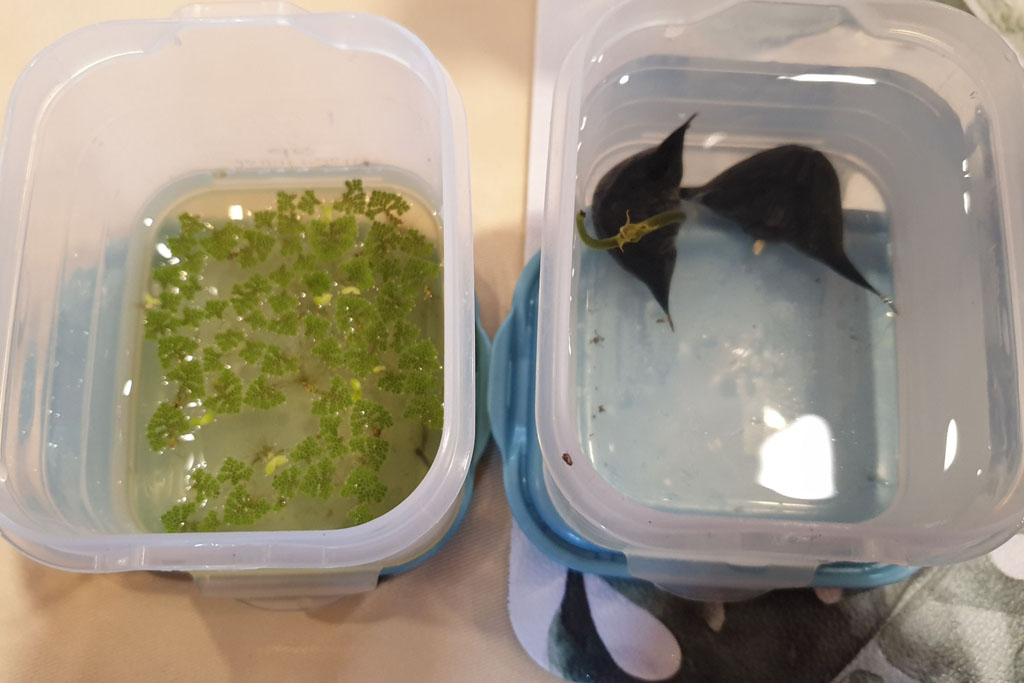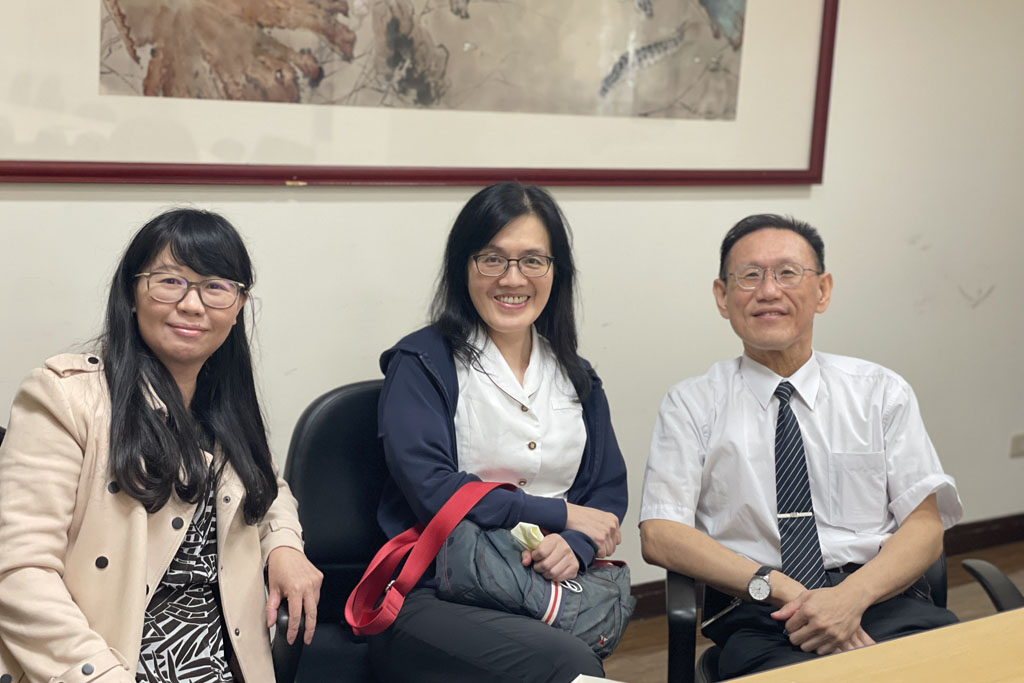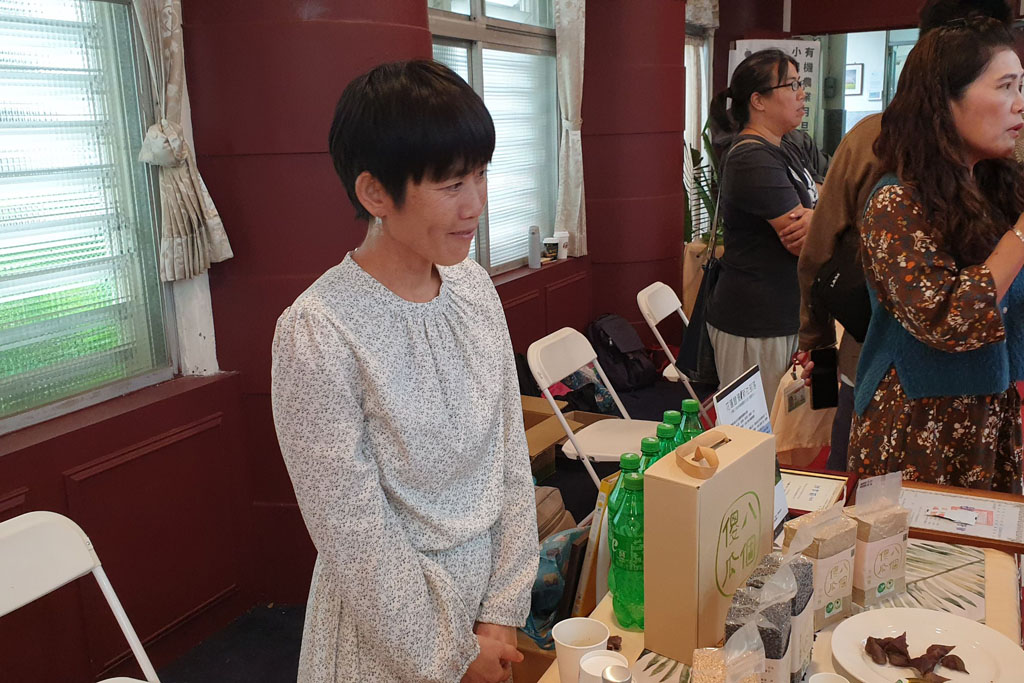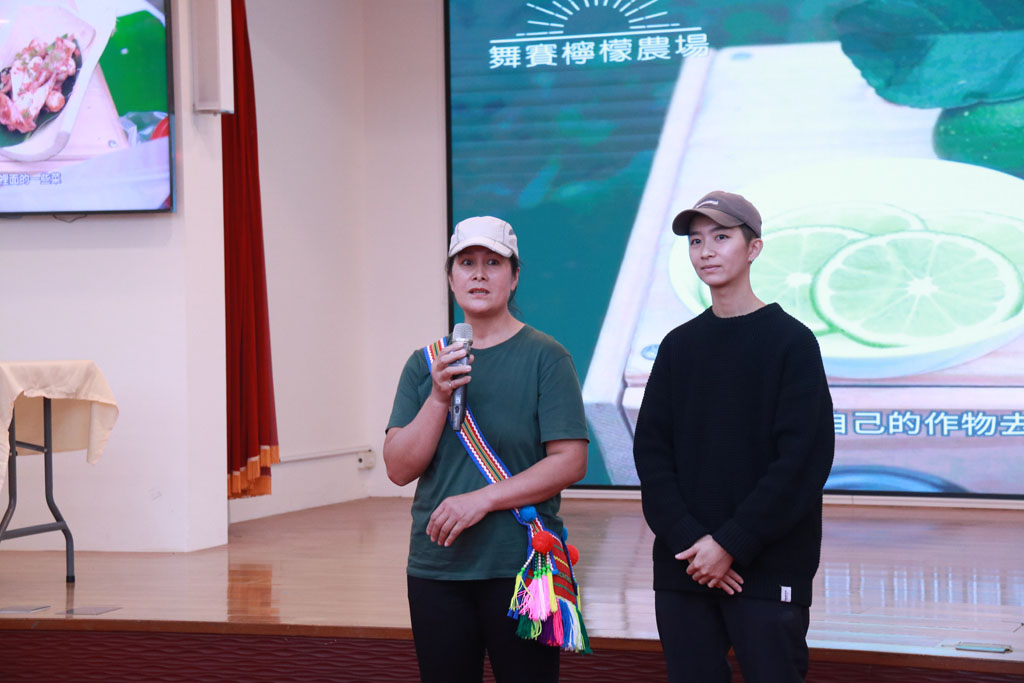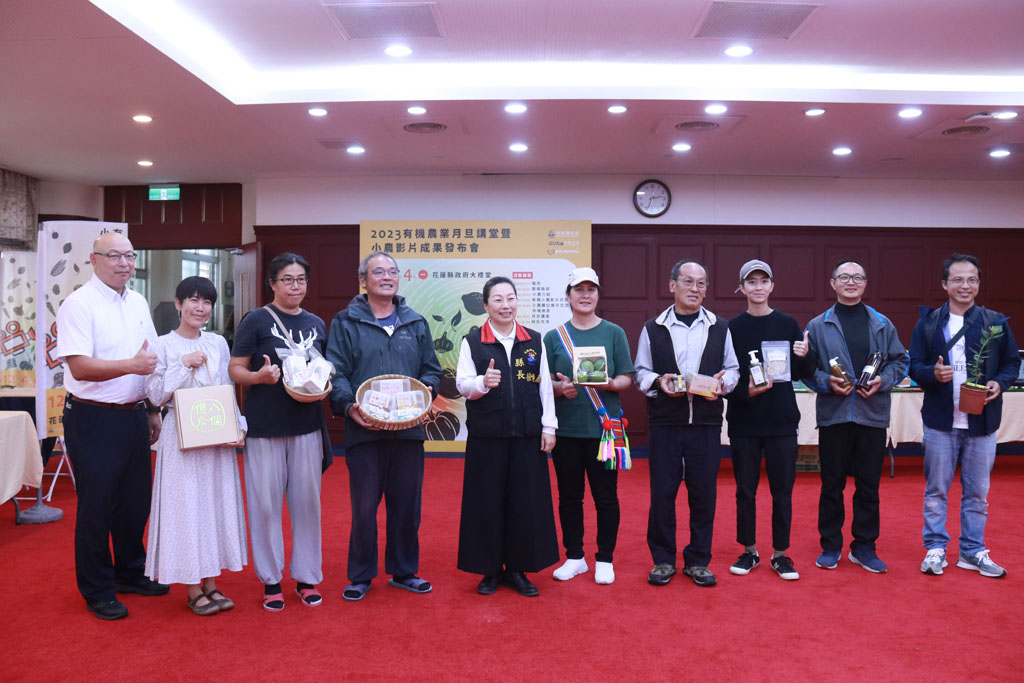Promoting Organic Farming: Hualien County Government and Tzu Chi University Host Small Farmers’ Video Launch Event
What reasons lie behind the choices of many young ladies to abandon city life in favor of returning to their tribal communities and embracing organic farming, despite its demanding more labor and eschewing pesticides? It’s part of a narrative about organic farmers in Hualien, where a collaboration between Hualien County Government and the TCU Instructional and Research Center of USR has been established to capture their experiences. A film highlighting the accomplishments of these organic farmers was unveiled on December 4, 2023, at the Hualien County Government building. At this event, Chun-Yu Lin from Wusay Lemon Farm said, “I rarely handle a microphone; my expertise lies in wielding a hoe.” This statement encapsulates a common challenge among farmers: they possess agricultural skills but often need more marketing know-how. The film aims to elevate their stories and broaden their impact.
In her speech, Hualien County Magistrate Chen-Wei Hsu emphasized Hualien’s ongoing efforts in land transformation. Highlighting the influx of farmers from other parts of Taiwan and abroad, who are turning to organic farming in Hualien, she expressed her appreciation for their role in establishing Hualien’s strong brand in organic agriculture. Magistrate Hsu also discussed the partnership between Hualien County Government’s Agriculture Department and Tzu Chi University. This collaboration, mainly through the USR (University Social Responsibility) program, attracts young students, many of whom consider making Hualien their permanent home. The “Organic Monthly Forum,” another initiative, brings together experts and farmers to share insights, which is crucial in adapting to the challenges of unpredictable extreme weather. These efforts collectively reinforce the commitment to strengthen Hualien’s organic agriculture sector.
A photography team invested nearly a year in documenting the endeavors of ten farmers, showcasing a diverse range of agricultural practices. This includes those engaged in PGS certification, smart agriculture, young entrepreneurs returning to rural settings, and standout examples of small-scale farming in both hilly and coastal landscapes. The featured farms are Four Seasons Pure Food Company, Mapolong Organic Farm, Eight Fools Farm, Xing Rui Pomelo Farm, Yin Shun Organic Tea House, Wusay Lemon Farm, Face on Road, Sun Clover Ecovillage, Laso’ay Ecological Farm, and Sun Morning Fruit Farm. The resulting video intimately captures the relentless toil and unique stories of these farmers, delving into each farm’s distinctiveness, guiding principles, and product offerings. The project aims to elevate consumer recognition and confidence in the region’s agricultural outputs.
These farmers, committed to avoiding the use of pesticides, don headlamps to catch horned beetles and carry homemade tools to fish out golden apple snails. At the film’s premiere, they shared with the audience face-to-face how they deal with increased physical labor and relatively more minor yields that come with these sustainable farming practices.
Organic farming plays a dual role in both environmental conservation and community preservation. Li-Jun Gong from Fengbin’s Eight Fools Farm explains how this agriculture fosters a deep sense of pride within tribal communities. A notable example is Xin She Elementary School, which has seen a significant increase in student enrollment over the past decade, growing from a mere 13 students to 18 and, at one point, surpassing 20. This surge is directly linked to the expansion of organic agriculture, which is deeply rooted in local land culture. Witnessing the dignity and optimism generated by this sustainable approach, residents are more encouraged to enroll their children in nearby schools and even return to their hometowns for employment opportunities.
“Pesticides are toxic and harmful to the skin,” says Chun-Yu Lin, also known as Wusay, from Wusay Lemon Farm. She decided to learn organic farming for health reasons and successfully transitioned. Initially, she struggled with marketing, having to sell her produce cheaply at local markets. During the pandemic, her daughter, Yi-Ru, working in Taipei, began sharing their products on Facebook and Instagram, receiving positive consumer feedback. Inspired by this success, she returned home in 2022 and established “Wusay Lemon Farm” in her mother’s name. Yi-Ru expressed her gratitude towards Tzu Chi University for their filming efforts. She is eager for the film’s release, hoping it will showcase the dedication of small-scale farmers to a broader audience.
The Director of the TCU Instruction and Research Center of USR, Yun-Chih Chiang, stated that the University is collaborating with Hualien County Government to transform Hualien into the capital of organic agriculture. Tzu Chi University’s Department of Communication Studies and Center for General Education offer various courses, and faculty members guide students into rural areas and tribal areas to learn firsthand. Students gain a deeper understanding of agricultural education and develop environmental literacy through participation. During this process, everyone discovered that each small farmer has a unique and fascinating story, encompassing human connections, bonds with the land, and cultural heritage. This revelation led to the creation of a film to tell these stories.
This year, Tzu Chi University and Hualien County Government’s Agriculture Department have organized a series of ten lectures titled “Organic Monthly Forum.” The program aims to enhance farmers’ expertise in organic agriculture, including management, processing, marketing, food safety, agricultural education, creating one’s own brands, soil nutrition, pest management, waste recycling, applications of photosynthetic bacteria, and interpreting fake agricultural news. These lectures have been well-received and highly regarded by the farming community. Following the conclusion of today’s presentation, Jia-Shan Tsai, a journalist from the agricultural media outlet “Upstream and Downstream News,” shared insights on the topic: “Fake Organic or Fake News? An Agricultural Journalist Decodes the Organic Myth.” The goal is to aid farmers through collaboration between industry, government, and academia and promote organic agriculture and a sustainable environment.
</pWhat reasons lie behind the choices of many young ladies to abandon city life in favor of returning to their tribal communities and embracing organic farming, despite its demanding more labor and eschewing pesticides? It’s part of a narrative about organic farmers in Hualien, where a collaboration between Hualien County Government and the TCU Instructional and Research Center of USR has been established to capture their experiences. A film highlighting the accomplishments of these organic farmers was unveiled on December 4, 2023, at the Hualien County Government building. At this event, Chun-Yu Lin from Wusay Lemon Farm said, “I rarely handle a microphone; my expertise lies in wielding a hoe.” This statement encapsulates a common challenge among farmers: they possess agricultural skills but often need more marketing know-how. The film aims to elevate their stories and broaden their impact.
In her speech, Hualien County Magistrate Chen-Wei Hsu emphasized Hualien’s ongoing efforts in land transformation. Highlighting the influx of farmers from other parts of Taiwan and abroad, who are turning to organic farming in Hualien, she expressed her appreciation for their role in establishing Hualien’s strong brand in organic agriculture. Magistrate Hsu also discussed the partnership between Hualien County Government’s Agriculture Department and Tzu Chi University. This collaboration, mainly through the USR (University Social Responsibility) program, attracts young students, many of whom consider making Hualien their permanent home. The “Organic Monthly Forum,” another initiative, brings together experts and farmers to share insights, which is crucial in adapting to the challenges of unpredictable extreme weather. These efforts collectively reinforce the commitment to strengthen Hualien’s organic agriculture sector.
A photography team invested nearly a year in documenting the endeavors of ten farmers, showcasing a diverse range of agricultural practices. This includes those engaged in PGS certification, smart agriculture, young entrepreneurs returning to rural settings, and standout examples of small-scale farming in both hilly and coastal landscapes. The featured farms are Four Seasons Pure Food Company, Mapolong Organic Farm, Eight Fools Farm, Xing Rui Pomelo Farm, Yin Shun Organic Tea House, Wusay Lemon Farm, Face on Road, Sun Clover Ecovillage, Laso’ay Ecological Farm, and Sun Morning Fruit Farm. The resulting video intimately captures the relentless toil and unique stories of these farmers, delving into each farm’s distinctiveness, guiding principles, and product offerings. The project aims to elevate consumer recognition and confidence in the region’s agricultural outputs.
These farmers, committed to avoiding the use of pesticides, don headlamps to catch horned beetles and carry homemade tools to fish out golden apple snails. At the film’s premiere, they shared with the audience face-to-face how they deal with increased physical labor and relatively more minor yields that come with these sustainable farming practices.
Organic farming plays a dual role in both environmental conservation and community preservation. Li-Jun Gong from Fengbin’s Eight Fools Farm explains how this agriculture fosters a deep sense of pride within tribal communities. A notable example is Xin She Elementary School, which has seen a significant increase in student enrollment over the past decade, growing from a mere 13 students to 18 and, at one point, surpassing 20. This surge is directly linked to the expansion of organic agriculture, which is deeply rooted in local land culture. Witnessing the dignity and optimism generated by this sustainable approach, residents are more encouraged to enroll their children in nearby schools and even return to their hometowns for employment opportunities.
“Pesticides are toxic and harmful to the skin,” says Chun-Yu Lin, also known as Wusay, from Wusay Lemon Farm. She decided to learn organic farming for health reasons and successfully transitioned. Initially, she struggled with marketing, having to sell her produce cheaply at local markets. During the pandemic, her daughter, Yi-Ru, working in Taipei, began sharing their products on Facebook and Instagram, receiving positive consumer feedback. Inspired by this success, she returned home in 2022 and established “Wusay Lemon Farm” in her mother’s name. Yi-Ru expressed her gratitude towards Tzu Chi University for their filming efforts. She is eager for the film’s release, hoping it will showcase the dedication of small-scale farmers to a broader audience.
The Director of the TCU Instruction and Research Center of USR, Yun-Chih Chiang, stated that the University is collaborating with Hualien County Government to transform Hualien into the capital of organic agriculture. Tzu Chi University’s Department of Communication Studies and Center for General Education offer various courses, and faculty members guide students into rural areas and tribal areas to learn firsthand. Students gain a deeper understanding of agricultural education and develop environmental literacy through participation. During this process, everyone discovered that each small farmer has a unique and fascinating story, encompassing human connections, bonds with the land, and cultural heritage. This revelation led to the creation of a film to tell these stories.
This year, Tzu Chi University and Hualien County Government’s Agriculture Department have organized a series of ten lectures titled “Organic Monthly Forum.” The program aims to enhance farmers’ expertise in organic agriculture, including management, processing, marketing, food safety, agricultural education, creating one’s own brands, soil nutrition, pest management, waste recycling, applications of photosynthetic bacteria, and interpreting fake agricultural news. These lectures have been well-received and highly regarded by the farming community. Following the conclusion of today’s presentation, Jia-Shan Tsai, a journalist from the agricultural media outlet “Upstream and Downstream News,” shared insights on the topic: “Fake Organic or Fake News? An Agricultural Journalist Decodes the Organic Myth.” The goal is to aid farmers through collaboration between industry, government, and academia and promote organic agriculture and a sustainable environment.
